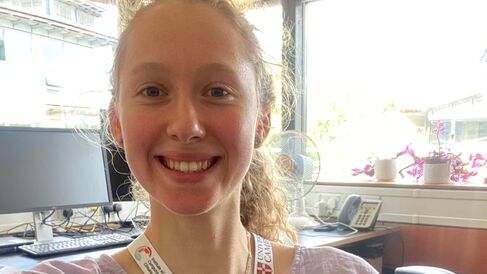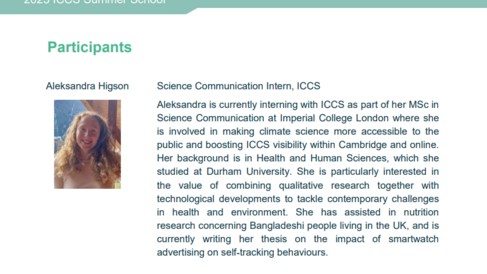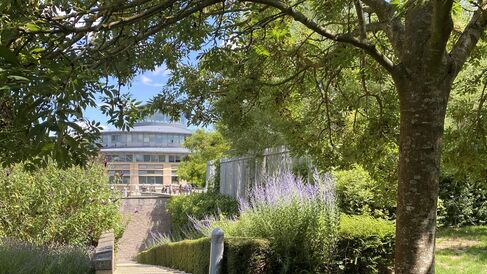
The following blog is written by Aleksandra Higson. After an initial two-month summer internship, she continued on into December, working on a variety of multi-media communications for the Institute of Computing for Climate Science (ICCS).
What a whirlwind of an experience! Interning with ICCS meant that I could have a go at everything comms-related, from writing up research stories, conducting interviews, to posting event updates live on Twitter.
As soon as I arrived in Cambridge I was thrown into organising the Institute’s annual summer school. For the first time, I was on the other side of that administrative email that tells you where to leave your bags upon arrival or setting up seven tables of cheese boards prior to a wine tasting evening. Even making event posters involved going through the process of professionally printing a test and then tweaking bits for the final version.
Having only arrived a week before the summer school was due to begin put me under time pressure to finish the participant handbook. I was secretly delighted to be given the responsibility. One of the sections included a personal bio for each participant. I had to go through and change everyone's so that it was in third person, typo-free and in-line with their picture. It was quite fun to see myself on the list, as shown below.

During the summer school itself I was able to engage with the talks, listen in on panel discussions, and participate in networking events. Taking part in technical computing workshops while photographing the sessions and also managing the zoom channel for online participants proved to be unreasonably challenging so I decided to take pictures at the beginning of each talk and distil the main ideas for regular updates on Twitter. The summer school enabled me to get to know the extended ICCS team as well as affiliated researchers, such as the VESRI community with whom our research software engineers collaborate.
After an initial period of business, I settled into doing some longer form writing as well as setting up Instagram and LinkedIn pages for ICCS. I worked on cleaning up the website by adding in visuals, including an interactive presentation about what the team does and how they are connected to other virtual institutes and climate research groups. Unfortunately, the University's somewhat outdated website builder made it harder to optimise. To work around this, I relied quite heavily on Canva's graphic creation tools to put in some softer edges and stylised photos. The website also includes an updated 'Our Team' page which now includes short summaries of a person's typical day at work as well as some hobbies outside of ICCS.
Being able to have a lot of autonomy over what I was working on was particularly exciting. Having recently made my first non-fiction documentary, I was keen to build on my editing skills. This led me to start on a promotional video for the ICCS homepage. I produced a draft version during my internship which I later re-worked and published the idea as two separate videos. They highlight the importance of the Institute's research software engineers and climate scientists in the context of the climate crisis.
I also got to interview Laura Cimoli and Jack Atkinson for an ICCS podcast. The two editors of MathsPlus Magazine acted as my mentors. We discussed my ideas and I learned from their experience making science content for public consumption. The episode introduces how climate modelling works from the perspective of a climate scientist and software engineer, highlighting the importance of interdisciplinary collaboration and the niche that ICCS fills by providing a pool of computing specialists to help solve the biggest challenges of climate modelling.

When interviewing research fellow Laura about her time as Co-Chief Science aboard a NOAA vessel, I learned about the measuring of the chemical composition of sea water in the North Atlantic. Laura oversaw the use of a special instrument that is lowered all the way to the sea floor like an anchor off the back of the ship, sending back continuous data to be analysed real-time. It has cylindrical bottles that shut at specific depths so that the gas and nutrient content of the water can be tested on board. To help explain this process. You can read about this on our blog.
My last week of the summer internship coincided with a deadline for the annual report to be ready for an important advisory board meeting. I think this was a blessing in disguise as I was able to contribute graphics and practise writing using a more formal tone. I also re-designed the monthly newsletters and learned to maintain an array of social media channels. Overall, I gained an insight into how ICCS is run and experienced first hand all the work goes on behind the scenes.
After the end of my internship I took a few weeks off to finish up my master's thesis after which I continued on with ICCS, building on the momentum that I started over the summer. During the past few months months I've been focussing on developing a brand guide to ease the creation of future communications and ensure consistency in how ICCS presents itself, whether during a presentation with the advisory board, at a conference training workshop, or on social media. I am proud of how our engagement has grown over time and of improved visibility.
Working with the team has been absolutely brilliant, and I couldn't have asked for a better experience. I felt like a valued member of the team from day one and would like to express my sincere gratitude to everyone at ICCS for being so kind and supportive throughout my time at ICCS.
